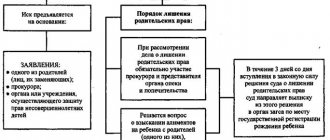Many women do not know how deprivation of paternity occurs - where to start, what documents are needed, with or without consent?
A biological father may have his parental rights terminated when he commits misconduct against his child.
According to the law, deprivation of paternity is carried out on minor children. Such issues can only be resolved in the courtroom and upon filing an appropriate application.
Today, paternity can be deprived if a man:
- does not pay child support;
- does not fulfill the responsibilities of a parent, namely: does not provide food, clothing, hygiene, medical care;
- abuses parental rights;
- sexually harasses a child;
- suffers from drug addiction or alcoholism;
- shows psychological or physical violence to the child;
- commits crimes that may harm the health and life of a child;
- refuses to participate in the lives of his children without reason.
Dear readers! To solve your problem right now, get a free consultation
— contact the duty lawyer in the online chat on the right or call: +7 Moscow and region.
+7 St. Petersburg and region. 8 Other regions of the Russian Federation You will not need to waste your time and nerves
- an experienced lawyer will take care of all your problems!
Which Russian government body reviews and makes decisions?
In Russia, the only authority that has the right to deprive parental rights is the court. Family Code of the Russian Federation, Art. 69 contains a complete list of reasons for this. The list is specific; a broad interpretation is impossible.
- Failure of the father or mother to fulfill their responsibilities towards the child, non-participation in his upbringing. In private cases, they do not pay alimony. It is not considered if fulfillment of duties is impossible for reasons beyond the control of the parent or due to a combination of circumstances. For example, in case of serious illness.
- They do not take the child away from the maternity hospital or other place of temporary stay, although there are no good reasons for this.
- Parental rights are abused. For example, they are not allowed to attend school, they are forced to steal or beg.
- The child is being abused. Both physical and mental violence are considered, as well as cases of sexual violence.
- The parent suffers from chronic alcoholism or drug addiction.
- An intentional crime has been committed against any family member, including a child or his other parent. The crime concerned human life and health.
To deprive a parent of his rights in court, it will be enough to prove at least one of the grounds (read about the grounds and consequences of this procedure here).
Objection to a claim for deprivation of parental rights
If a parent does not want to be deprived of parental rights, he can file an objection to the claim. An objection is a written response to claims. In it, the defendant explains why he should not be separated from the child.
It is not necessary to file an objection. You can explain your position orally during the process. But you can order an objection from a lawyer. It will be easier for the defendant to protect his interests in court with a legally competent document.
The objection must be accompanied by evidence that it:
- regularly pays child support or financially supports the child;
- maintains a relationship with a son or daughter;
- has a regular income;
- is not registered with a psychiatrist or narcologist.
Filing an objection does not guarantee that the court will side with the defendant, but will increase the chances of keeping the child in the family.
Procedure: who and how can deprive a parent of the opportunity to raise his child?
Deprivation of parental rights is a long process that is only possible through the courts. The most significant factor in depriving a father or mother of parental rights is pre-trial preparation and collection of evidence, which is where the procedure should begin. The judge's decision depends on how detailed and significant the evidence is.
Deprivation of parental rights of both parents is possible if the grounds for deprivation from Art. 69 of the Family Code of the Russian Federation. In this case, one lawsuit is filed in which the father and mother will act as co-defendants.
A claim can be filed by:
- Guardian or trustee of a child.
- District USZN.
- Organization for the protection of orphans.
- Prosecutor.
Depending on the basis for deprivation of rights, the plaintiff may need documents from law enforcement agencies, bailiffs, guardianship authorities and other authorities. To deprive a father or mother of parental support, including a single person, one will have to go through the same path as in the case when the process is initiated by the grandmother.
Appeal to the Ministry of Internal Affairs
Child abuse and intentional crimes against the life and health of family members are proven if there have been calls to the police or court proceedings. For example, the court for deprivation of parental rights must take into account cases of beatings and domestic violence recorded by the police, as well as other violations.
A plaintiff who contacts law enforcement agencies may receive:
- copies of decisions if the parent committed administrative offenses;
- a certificate of police calls to the house, if any;
- characterization of the parent’s personality compiled by the district police officer.
If a parent has committed a crime for which he has served or is currently serving a sentence, he must obtain a copy of the sentence from the court. It will describe the crime, the harm caused and evidence of guilt. The copy must be certified by the judge’s signature and official seal.
If a parent displays violence against a child, you should contact the police for a medical examination of the victim and then to initiate a criminal case under Art. 144 and 145 of the Criminal Procedure Code of the Russian Federation. After this, the police officers conduct an investigation and submit their conclusion to the court at the plaintiff’s place of residence.
The judge makes a verdict of acquittal or conviction. A copy of the conviction will be evidence for the court when filing a claim to deprive a parent of his rights.
Contacting the FSSP if your ex-husband or wife evades alimony
To prove in court for deprivation of rights a parent’s malicious evasion of paying child support, documents from the FSSP will be required. Evasion is considered malicious if a person ignores demands for payment of funds for more than 4 months.
To claim alimony, the bailiff may:
- seize the debtor's property and accounts;
- prohibit travel outside the Russian Federation;
- revoke your driver's license.
It may be that all these measures did not bring results. In this case, criminal prosecution of the debtor is possible. It can be initiated either by the FSSP itself or by the recovering party. The plaintiff must file a petition for criminal prosecution for failure to pay child support to the territorial department of the Federal Bailiff Service.
To the court for deprivation of parental rights, the plaintiff may provide:
- court decision to collect alimony;
- court order;
- certificate of arrears in payment of alimony (issued by a bailiff);
- a copy of the enforcement proceedings;
- copies of documents on the administrative fine for evasion of alimony payments;
- a copy of the petition for criminal prosecution of the defendant.
All court documents must be certified.
Gathering evidence of inappropriate behavior and drunkenness
If there has been inappropriate behavior of a parent, for example, an alcoholic mother who is deprived of maternal rights in favor of her father, it will be better to confirm this in court both with documents and with testimony. If the father and mother are drinkers or drug addicts, it would be most convincing to provide the court with the relevant medical reports, extracts from outpatient records or certificates from medical institutions, as clear evidence of the need to deprive the parents of their rights to raise children.
Additional evidence may be copies of police certificates if it was necessary to call a squad due to the defiant or aggressive behavior of a drunken defendant. Another option is copies of decisions on administrative penalties, if they were imposed for fights and rowdy behavior while intoxicated with alcohol or drugs.
If there is no documentary evidence, you need to find witnesses who can testify in court. The following may act as witnesses:
- relatives;
- neighbours;
- Close friends;
- defendant's colleagues.
It is important that the chosen witness can confirm in court the inappropriate lifestyle of the parent, his systematic use of alcohol or drugs and the negative impact of these circumstances on the child.
What documents are needed: complete list
When preparing documents for the court, the following must be attached to the statement of claim:
- Child's birth certificate. If you do not have the original document on hand, you can obtain a copy by contacting the registry office.
- Certificate of paternity if the child was born out of wedlock or paternity was established in court.
- Receipt for payment of state duty.
- Documents confirming the plaintiff’s income, his permanent job and living space. These documents will show the court that the plaintiff can support the child on his own.
In addition, all possible written evidence is collected to confirm the legitimacy of the claim. Among them may be:
- A court decision that the defendant is guilty of a crime against the life or health of a family member.
- Documents confirming evasion of alimony payments:
- court decision on collection;
- certificate of non-payment;
- calculation by the bailiff of the debt on the date of filing the claim;
- certificate of tracing the defaulter.
- Information about the defendant’s administrative offenses, police calls related to inappropriate behavior, drunkenness, etc.
- Other documents that can be obtained from law enforcement agencies, including a reference from the local police officer.
- Certificates from traumatology, if there have been cases of physical violence against a child or plaintiff.
- Certificates from medical institutions confirming alcohol or drug addiction.
- Conclusion of a child psychologist about the negative impact of a parent’s behavior on a child.
- Certificates from school or kindergarten stating that the child attends them. Additionally, you can ask to indicate whether the defendant visited these institutions, when and under what circumstances.
- Photographs, video recordings, notes, audio messages that can confirm the circumstances that became the basis for going to court.
- List of witnesses, if any.
Additionally, you need to prepare conclusions from guardianship.
Notarized copies of documents are provided to the court. Or you can attach regular copies to the application, but in this case, be sure to bring all originals to the courtroom. When filing a claim, you will need several copies of all documents to hand over to the prosecutor, defendant, etc.
Guardianship and trusteeship
When depriving the rights of one of the parents, the court must make sure that the other has adequate conditions for the life and upbringing of the child. This is assessed by the guardianship authorities.
After filing a statement of claim, for example, to deprive the father of a drunkard of his rights, a copy of the document along with all the attached papers should be transferred to the guardianship. After this, the guardianship officer who is dealing with your issue will visit the house to look at the living conditions. The date of the visit can be agreed upon in advance. It’s good if all family members living there are at home during the visit - perhaps the employee will have questions for them.
The conclusion drawn up by the guardianship is submitted to the court and attached to the case. If the child is over 10 years old, the guardianship officer talks with him and finds out his attitude towards the deprivation of his parent’s rights. A written statement of consent from the child is not required, but during the court hearing his opinion will be voiced and taken into account (Article 57 of the RF IC).
How to prepare and where to file a claim?
A claim for deprivation of the parental rights of the father or mother must be filed at the place of residence of the defendant, in the district court (Article 28 of the Code of Civil Procedure of the Russian Federation). If in the application the plaintiff demands to simultaneously deprive the second parent of his rights and collect alimony from him, it can be submitted at the plaintiff’s place of residence (Part 3 of Article 29 of the Code of Civil Procedure of the Russian Federation). The statement of claim can be brought to court in person or sent by mail.
The plaintiff in a case of deprivation of parental rights may be:
- one of the parents, and it does not matter whether he lives with the child;
- guardians, adoptive parents, trustees and other persons replacing parents;
- institutions or bodies protecting the rights of minors;
- prosecutor.
The statement of claim must indicate the details of the plaintiff, defendant and other persons involved in the case (prosecutor, guardianship authorities, etc.).
In the text of the statement:
- The fact and circumstances of the child’s birth, recognition of paternity (if any) are indicated, and the relationship between the parents is described.
- Next, the plaintiff sets out for what reasons, in his opinion, the defendant should be deprived of parental rights, supporting them with documentary evidence or references to witness testimony.
- After describing all the circumstances, you need to write down a request to the court to deprive parental rights, make a list of attached documents, sign and date.
We do not recommend completing the documents yourself. Save time - contact our lawyers by phone:
8 (800) 350-29-87Moscow
A court hearing is scheduled within 5 days after the statement of claim is accepted.
Where and how does the claim review take place?
Cases of deprivation of parental rights are heard in the district court. In addition to the judge, the participation of a representative of the guardianship and trusteeship authority and a prosecutor is mandatory. They give their conclusions on the case.
In most cases, such cases are considered at several meetings, as clarifications, additional evidence, and consideration of witness testimony are required. First, a preliminary meeting is scheduled, at which evidence is transferred and subpoenas and requests are issued, then the main meeting, at which the case will be considered on its merits. Hearings may be postponed, including at the request of the plaintiff (for example, in case of illness).
Making a decision
Based on the results of the trial, the judge makes a decision. Either a decision will be made to deprive the defendant of parental rights, or the claim will be denied.
The court refuses to deprive a parent of his rights unless sufficient evidence has been collected of his guilty behavior. In exceptional cases, the court may refuse to satisfy the claim even if the necessary evidence is available, based on the characteristics of the personality and behavior of the defendant, as well as other important circumstances.
The court decision comes into force within 30 days from the date of the decision. During this period, the defendant has the opportunity to appeal. If this does not happen, after another 3 days the court sends the data on the deprivation of parental rights to the registry office so that changes can be made to the child’s birth certificate. After the court decision has entered into legal force, you can obtain a resolution from the court with the appropriate mark.
We do not recommend completing the documents yourself. Save time - contact our lawyers by phone:
8 (800) 350-29-87Moscow
How much does the procedure cost: the amount of state duty
In accordance with paragraphs. 15 clause 1 art. 333.36 of the Tax Code of the Russian Federation, the plaintiff does not pay the fee for going to court to deprive parental rights, because acts to protect the legal rights and interests of the child.
Filing a claim
In accordance with the requirements of the current legislation on family law, state guardianship and trusteeship authorities and the district prosecutor's office have the right to initiate a case for deprivation of paternity. The second parent has the right to file a claim with justification.
The law allows for the deprivation of paternal rights without the consent of the father. In order for the court to make a positive decision, an individual approach by the judicial authority to the case under consideration is required in compliance with the main goal - not to harm the child.
Special cases
If one or both parents are minors
If the child’s parents are minors, the procedure for depriving them of their rights does not differ from the standard one. The reasons for this are the same as for adults. It is important that only persons over 16 years of age can independently exercise parental rights. Previously, a designated guardian acts on their behalf.
What to do if mom or dad is in prison?
The mere fact that a child's parent is in prison is not grounds for depriving him of parental rights, unless he is convicted of crimes against family members. Otherwise, it will be necessary to prove in court that the parent shirked his duties, abused the child before imprisonment, or otherwise harmed him.
How is the process and justification of jurisdiction of the case against a foreigner?
The grounds for depriving a foreign citizen of parental rights are the same as for Russian citizens (Article 69 of the Family Code of the Russian Federation). In this case, the claim must be filed at the place of residence of the defendant . If a foreign parent does not have a permanent place of residence on the territory of the Russian Federation, you can apply to a Russian court only if you justify the jurisdiction of the claim. This can be done by combining the claim for deprivation of rights with another dispute.
The following options are possible:
- A claim simultaneously for deprivation of parental rights and for the collection of alimony (clause 3 of Article 70 of the RF IC). Served at the place of residence of the plaintiff. If alimony has already been collected, this option is not possible.
- Claim for deprivation of parental rights and divorce. Filed in the district court of the plaintiff's choice.
Also, if the defendant has any property in Russia, it is possible to file a claim at the location of the property. In this case, the plaintiff must provide evidence of the existence of this property in order for his claim to be accepted.
If there is a need to go through the deprivation of rights procedure again in a foreign court, the decision of the Russian court will be taken into account there.
For an adult
After the child reaches 18 years of age, his civil capacity begins (Clause 1 of Article 21 of the Civil Code of the Russian Federation). Parental rights apply only to minor children (clause 2, article 61 of the Family Code of the Russian Federation). Thus, when the child reaches the age of majority, parental rights cease to apply; an additional deprivation procedure is not necessary.
Different situations happen in life - serious illnesses, financial disadvantage, psychological problems, etc. You can voluntarily renounce parental rights to a child and send him to an orphanage to be raised by the state, temporarily or permanently, from the moment of his birth until he reaches adulthood. If you were forced by circumstances and you decided to take this terrible step, then in our articles you will learn all the details of these procedures.
What is termination of parental rights?
Deprivation of parental rights is understood as the most serious measure of family legal responsibility. It is used in relation to blood parents who expose the child to danger. That is, if you leave a child in the family, this can cause injury or death.
Deprivation is applied in exceptional cases. On the one hand, the court punishes the parent, on the other, it saves the child. But the measure can only be used if there is no other choice.
From the moment the court decision enters into legal force, the child must be isolated from the parent. He cannot live with him in the same apartment, and in especially difficult cases, meet with them and maintain communication. If the parent does not pose a danger to the child, the child’s guardian may allow them to meet and communicate.
Sample statement of claim for deprivation of mother's parental rights
Voluntary renunciation of paternity
How should a defendant act to protect himself and avoid sanctions?
Cases of deprivation of parental rights are always very emotional, and it is important for the defendant, confident in his innocence, to prove with facts that the accusations against him are erroneous. The defendant can provide documents confirming his innocence and call witnesses who can support him.
How to write an objection, to which organization and how is it submitted?
The defendant who has received the claim can draw up and submit an objection to the body depriving him of parental rights, that is, to the court. It indicates its disagreement with the plaintiff’s arguments and describes its point of view, providing evidence of the conscientious performance of the duties of a parent. The following can be used as evidence:
- certificates of payment of alimony;
- certificates of absence of drug addiction or alcoholism;
- receipts for the purchase of things and toys for the child;
- witness statements, etc.
We do not recommend completing the documents yourself. Save time - contact our lawyers by phone:
8 (800) 350-29-87Moscow
You can submit an objection to the court at any time before the decision is made, but it is better to do it as early as possible. You can submit the document in person to the judge, through a court expedition or by mail. There is no need to pay a fee when filing an objection.
How much does it cost to terminate parental rights?
The procedure for depriving parental rights is provided to protect children's interests. Therefore, you can apply absolutely free of charge. If a conscientious parent or guardian does not have sufficient legal knowledge to go to court, then you can file an application with the prosecutor's office or the guardianship department. In this case, it is necessary to prepare the maximum list of evidence that the only possible measure of protection for the child in this situation is deprivation.
If a guardian or parent wants to go to court on their own, they may face the following costs:
- filing a claim – from 2,000 rubles;
- legal consultation – from 2,000 rubles. (on our website - free);
- representing the interests of the plaintiff in court – from RUB 5,000. in one meeting.
Cancellation of a court order
According to Article 72 of the RF IC, a parent deprived of his rights can restore them. This also happens in court. The parent files an application to the court. It, just like the case of deprivation, will be considered with the involvement of the guardianship authorities and the prosecutor. The court will check whether there have been changes in the behavior of the deprived parent, what kind of lifestyle he leads and how he feels about raising children at the moment.
Restoration of parental rights is impossible in two cases:
- The child has already been adopted and the adoption is in force.
- A child over 10 years old has objections to the restoration of the rights of the parent.
- The child is already an adult.
When submitting an application, the plaintiff pays a state fee of 300 rubles. (Article 333.19 of the Tax Code of the Russian Federation).
List of required documents
- Child's birth certificate.
- Receipt for payment of state duty.
- Any documents proving that the plaintiff is ready to take on the responsibilities of a parent again (what responsibilities and rights remain after the deprivation procedure for both parties?). It can be:
- characteristics from work;
- certificates of completion of treatment for alcoholism;
- documents on payment of alimony;
- witness's testimonies.
Appeal
Within 30 days from the date of the court's decision to deprive parental rights, the defendant may appeal it by filing an appeal with the court that made the decision. A properly drafted appeal must contain:
- the name of the court where the defendant, who has been deprived of parental rights, applies;
- personal data of the submitter (full name and place of residence);
- information about the court decision that is being appealed: when it was made and by whom;
- request to cancel a court decision;
- the grounds for canceling the decision, they must be described in detail, referring to the laws;
- list of submitted documents, if any;
- number and signature of the complainant.
We do not recommend completing the documents yourself. Save time - contact our lawyers by phone:
8 (800) 350-29-87Moscow
Deprivation of parental rights is a long and complex process; it will not be possible to quickly deprive a father of his rights, just like a mother. It is regulated by the Family Code of the Russian Federation and is possible only in case of guilty behavior of one or both parents. To deprive the other parent of his rights, the plaintiff must collect all possible evidence of such behavior and correctly file a claim in court. The court's decision is reversible: the former parent can restore his rights by changing his behavior and presenting evidence of this.
How to start depriving parental rights?
Before going to court, it is necessary to prepare evidence. To do this you need:
- Get a reference from the kindergarten or school for the child. It is necessary that the document reflects who brings the child, who picks him up, who participates in parent-teacher meetings, what the child looks like in the educational institution, whether he always has the necessary supplies, whether he attends sections or clubs.
- Get a character reference for the parent from neighbors. It needs to show whether he participates in the social life of the yard, in cleanup days, in meetings, how he communicates with neighbors, and whether he smokes in public places.
- Get a reference for the parent from the district police officer. It must reflect whether the parent is registered as a person not fulfilling parental responsibilities, or whether he has been brought to administrative responsibility. The district police officer may refuse to provide information. In this case, you must attach to the claim a petition requesting information from the Ministry of Internal Affairs.
- Contact the guardianship department to conduct an inspection of the living quarters in which the parent and child live. The inspection report will be issued to the applicant within 3 days from the date of the inspection.








